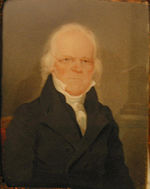Henry William de Saussure, Date of Birth, Place of Birth, Date of Death
TweetHenry William de Saussure
American politician
 Date of Birth: 16-Aug-1763
Date of Birth: 16-Aug-1763
 Place of Birth: Pocotaligo, South Carolina, United States
Place of Birth: Pocotaligo, South Carolina, United States
Date of Death: 26-Mar-1839
Profession: politician
Nationality: United States
Zodiac Sign: Leo 
About Henry William de Saussure
- Henry William de Saussure (August 16, 1763 – March 26, 1839) was an American lawyer, state legislator and jurist from South Carolina who became a political leader as a member of the Federalist Party following the Revolutionary War.
- He was appointed by President George Washington as the 2nd Director of the United States Mint, was a co-sponsor of the legislation that established the South Carolina College which was to become the University of South Carolina and was given the title of Chancellor as a justice of the SC Equity Court, also known as chancery court.
- In this capacity he wrote and codified much of the state's equity law still in use today.
- He served as Intendant (Mayor) of Charleston while his son, William Ford de Saussure, likewise, served as Intendant (Mayor) of Columbia, SC. He was a principal investor in founding what was originally intended to be the city's Federalist leaning newspaper, the Charleston Courier in 1803.
- The newspaper still exists today as it was merged with others over the course of two centuries to become The Post and Courier.
- As a sitting appellate court judge, his opinions on a variety of issues were widely published under a pseudonym, which was the custom then for public officials, particularly judges, who wished to express their views away from the bench.
- His opinions were highly critical of the summary abridgment of rights of the accused during the Denmark Vesey trials, purportedly in the name of public safety.
- He and others like him suspected there was less substance to the charges of a conspiracy to organize a slave revolt than the public in Charleston was being led to believe. He openly opposed Nullification along with other leading South Carolinians.
- After the Federalist Party faded in the early 1820s, he was a voice for Unionist moderation before a rising tide of States Rights supporters swept the stage of all others in South Carolina a generation later.
- Though deep political differences would eventually separate them, John C.
- Calhoun studied law in the offices of Henry de Saussure and Timothy Ford, his partner and brother-in-law.
- As a founder and early trustee of the University of South Carolina in Columbia, one of the original buildings located on the Horseshoe at the center of the campus, DeSaussure College, was named in his honor.
Read more at Wikipedia


